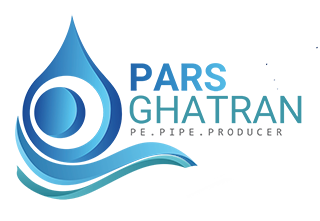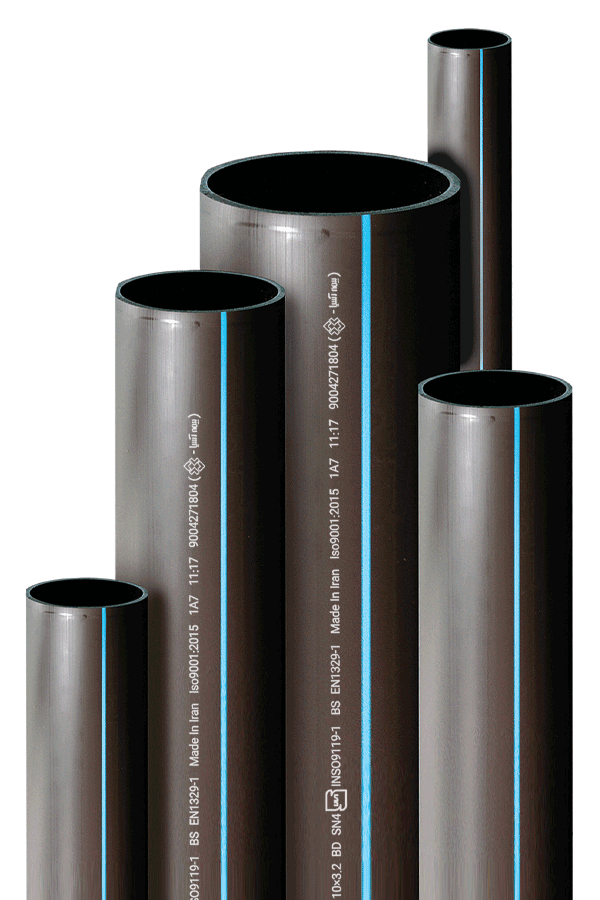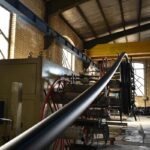Introduction to the advantages of polyethylene pipes over steel pipes (carbon steel)
- Article
- Introduction to the advantages of polyethylene pipes over steel pipes (carbon steel)
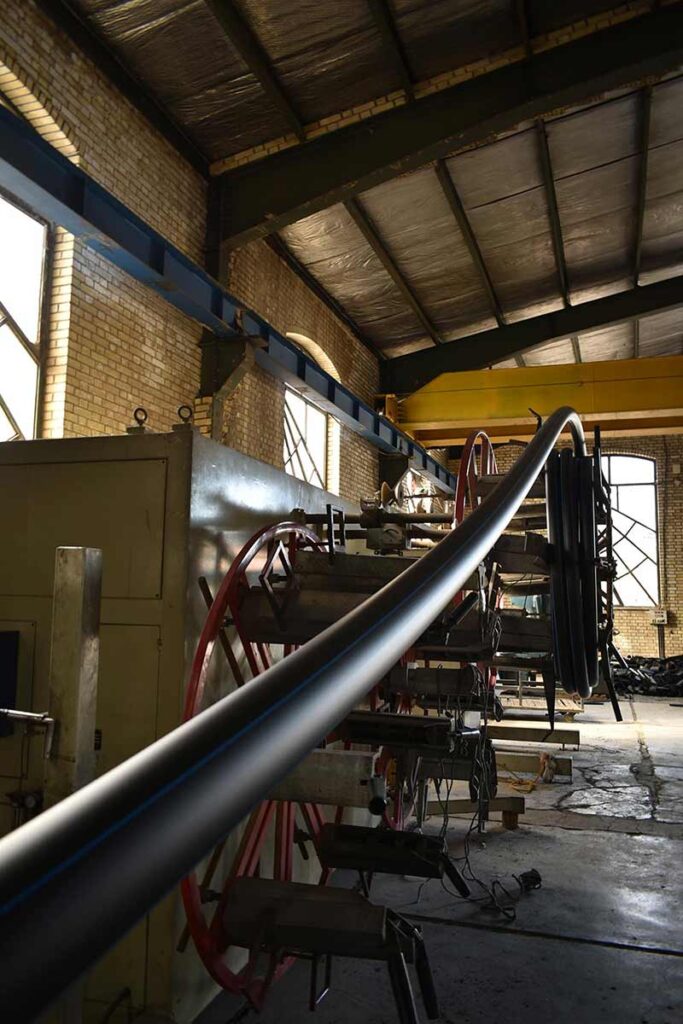
- July 4, 2023
- 10:00 am
Introduction to the advantages of polyethylene pipes over steel pipes (carbon steel)
Nowadays, pipes are manufactured with different qualities and for different applications. What matters is to be aware of the pipe’s properties and compare them with each other. This type of comparison and analysis helps the employers to make better decisions about purchasing pipes. Therefore, studying articles in this area might be helpful. In this section, we aim to explain the advantages of polyethylene pipes over steel pipes (carbon steel).
First let us talk about the important properties of the pipes. Later, we will separately analyze these factors about polyethylene and steel (carbon steel) pipes. The main characteristics of pipes are as follows:
- Compatibility with environment
- Bedding
- Seismic behavior
- Easy shipping
- Fittings and connections
- Using saddles to mount valves
- Components and fittings
- Chemical resistance
- Buoyancy and application in marine projects
- Abrasion resistance
- Tensile strength
- Compressive strength and flexural strength
Environmental impacts
The first factor in comparing polyethylene and steel (carbon steel) pipes is the pipe’s impact on the environment. As you know, steel pipes are prone to rusting due to their reaction with oxygen which might have a negative impact on the environment.
Whereas, polyethylene pipes are highly resistant against microbial attacks. That is because polyethylene pipes do not contain nutrients for microorganisms. In other words, polyethylene pipes are more eco-friendly compared to steel pipes.
Bedding
 Steel pipe
Steel pipe
One of the most important advantages of polyethylene over steel (carbon steel) pipes is the importance of their bedding. As you know, deflection control is one of the most important factors for measuring pipe resistance against external loading, especially in steel pipes. In other words, steel pipes must get surrounded by compacted soil for equal distribution of lateral forces.
In steel pipes the bedding should not contain rocks, clods, etc. Whereas, in polyethylene pipes a flat bottom with slight or no embankment would be satisfactory.
Seismic Behavior
The seismic behavior of pipes is another important factor when exploring the advantages of polyethylene over steel (carbon steel) pipes. Polyethylene pipes, especially the heavy duty types are made using electrofusion welding. This makes them suitable for use in quake-prone areas.
Steel pipes show a high resistance against earthquake compared to concrete, cast iron, and asbestos-cement pipes, although such pipes will only function well under special conditions, such as welded connections, integrated pipelines, and paths with bends and curves.
Easy shipping
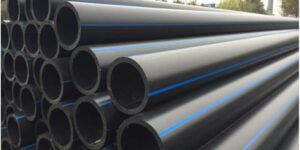 Polyethylene pipe
Polyethylene pipe
Light weight is another advantage of polyethylene over steel (carbon steel) pipes. This makes shipping, loading and even use of polyethylene pipes easier. In addition, these pipes are highly impact resistant compared to steel pipes. As a result, polyethylene pipes almost do not wear during loading.
Whereas, steel pipes wear easily during shipping due to their higher weight and lower impact resistance. On the other hand, polyethylene pipes are highly cost-effective due to the mentioned properties since they have a lower shipping cost compared to steel pipes.
Pipes Connections and Fittings
Polyethylene pipe connections differ based on their applications. For instance, in gas and water supply systems connections can handle pressures up to 10 atms and follow DIN 16963 standards of Germany in other projects. Some of the advantages of polyethylene over steel pipes (carbon steel) based on their connection type are as follows:
- Resistance against abrasion, corrosion, and chemical substances
- Resistance against impact, pressure, and seismic shocks
- Resistance against cracking, breaking, and rust
- Smoothness on the outside and inside
Using saddle for mounting valves
One of the interesting advantages of polyethylene over steel (carbo steel) pipes is that unlike steel pipes these pipes do not need saddle for mounting valves.
Connections and Fittings
Another advantage of polyethylene pipes over steel (carbon steel) pipes is their connectability since polyethylene connections and fittings are low-cost compared to steel pipe connections. Moreover, since polyethylene pipes seal they connect easily.
On the other hand, since polyethylene pipes are leak-free they are installed in less time. It is interesting to know that unlike steel pipes polyethylene pipe fittings come in a variety of types and various welding methods are used for connecting them.
Chemical Resistance
Another advantage of polyethylene pipes over steel (carbon steel) pipes is their resistance against different chemical substances. They have a quite high resistance against all organic and inorganic materials due to the special polyethylene structure in them. In other words, these pipes allow no chemical permeation.
Pipe Buoyancy and Applications in Marine Projects
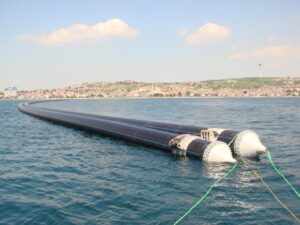 Polyethylene pipe
Polyethylene pipe
Pipe buoyancy is an important characteristic in pipes which makes them suitable for marine applications. This is considered another advantage of polyethylene over steel pipes since steel pipes have no buoyancy due to their heavy weight.
Therefore, they cannot be used in marine projects. Although polyethylene pipes have such a property, certain measures need to be taken at pipe sites during raised groundwater levels. Such measures are necessary to prevent pipe displacement.
Abrasion Resistance
As you know, every tool including steel pipes have a hard surface. Whereas, polyethylene pipes have a softer surface compared to steel pipes. This is important since pipes might get cuts and damages during shipping and loading.
Obviously, the softer the surface the less the amount of damage and abrasion. In other words, this type of strength is another advantage of polyethylene pipes over steel (carbon steel) pipes.
Tensile Strength
Tensile strength is an important factor when it comes to internal and external forces. Unlike polyethylene pipes steel pipes have low ductility. This makes them prone to rupture under pressure. Whereas, polyethylene pipes have a high tensile strength and are very suitable for use in uneven surfaces.
Compressive and Flexural strength
The last advantage of polyethylene pipes over steel (carbon steel) pipes is their high compressive strength. Steel pipes are highly vulnerable to earthquake, seismic shocks, and similar changes. Whereas, polyethylene pipes might only get cracks of 37 to 100 cms under high pressures due to their high strength.
